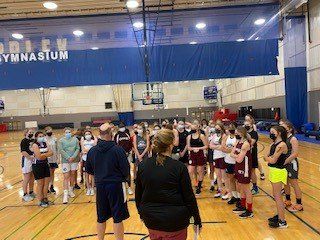What does Player Development Look Like
As a parent what are looking for from a program
When it comes to player development, and how we help people actually improve at playing the game, there are a lot of ideas. Some people will point to games, you need to be playing a lot to learn how to execute in game situations. Some will point to off court factors, you need to be training physically, getting bigger and stronger. Some will point to practice, you need to be working on your skills constantly. Others will point to a mix of all of these things, which is probably closer to the truth. If we do settle on a mix then the next question is what is the mix, what is the magic formula. What is a young player or a parent looking for in terms of what a club or team offers that will help their child reach their potential. It is worthwhile looking at a number of factors and what they mean.
First off, you absolutely need productive practice. A player needs to be in a position to work with a knowledgeable coach who can teach them skills that have an impact in real world competitive environments. Look for a track record of success when it comes to players who have played there and gone on to accomplish things at the provincial, national or post secondary level. Does the coach make their athletes feel like they have control of their own destiny and their future will be decided by the time and effort they put forward and not by some magic promise the coach provides. If the "Me Too" movement has taught us anything it is that we are not investing in the power of an individual to make a person into something, that always comes at a cost personally or psychologically. We are looking for coaches who point players in the right direction and give them the tools to move forward, hopefully to one day move beyond that coach to the next step on the ladder. Finding a program that places a priority on practice and uses practice to work on skills and concepts that make players better is crucial.
Next you need the ability to improve yourself physically. Unlocking your best potential involves an athlete being in the best possible physical shape. I will always remember a strength and conditioning talk in which the coach said the old saw of, "Mental is to physical is as 9 is to 1." was simply untrue, that sport is a physical pursuit and as such, "Physical is to mental as 9 is to 1." It caused me to rethink my whole process. Physical fitness is at the core of everything. I cannot be mentally tough if all my body lets me consider is the fact that I am exhausted. I cannot have confidence in my abilities if I know that I have not gotten myself in peak physical shape. Choosing a program that pays no attention to conditioning or does not hold players accountable for their conditioning, or worse plays players beyond the limits of their ability to stay focused and physically playing hard all leads to a player that is non-competitive. Make sure the program you select or the coach that you play for puts a priority on physical fitness, rewards players for their gains and does not play people beyond the limits of their ability to be physically competent. Playing a player 40 minutes a game is every bit as damaging as not playing a player at all.
Finally, and perhaps most importantly, a player must learn how to compete. I remember long time Acadia men's basketball coach Dave Nutbrown saying once, "We don't need more weight rooms, we need more compete rooms, throw two players in there, lock the door and let them get after it!" While that might be a little extreme, there is some truth in it. Players need to learn how to compete, they need to learn how to give their body and soul to a thing, not for the recognition or awards that come, but for the shear joy of knowing there was nothing more they could have done. That kind of effort produces peace, a lasting sense of satisfaction, that what-ever happens, I did my job as well as it could be done. Learning to compete requires a player having the ability to work to close to exhaustion, have suitable time to recover and then repeat the process. Anything that interrupts that cycle helps make a player less competitive, less likely to give best effort.
These are the factors you are looking for, if you look closely you will see that two things are glaringly absent, one of which we have already mentioned. The first thing is games, we will discuss that in the rest of the article, the role that games play. The second thing is winning. While I feel that winning has a role or a place at a certain level, competing is way more important. Getting after it and coming up short is every bit as important as winning. Winning is a function of talent and luck, not coaching. Competing is more a function of coaching. I want to play in a competitive atmosphere, not necessarily a winning one, although the two are often intermingled. Winning in and of itself often requires that players sacrifice certain amounts of playing time, or skill development, or opportunity to allow the best players to carry the day. Being in a competitive atmosphere may require that I focus on my best attributes and the things I do best to help my team compete, but I am still given opportunity and I still get chances to try different things, regardless of outcomes. If I show advancement in a certain skill I will get more opportunity to use it, things which are not productive will be pared from my game, all in the name of competing, but few if any things are forbidden. Every player should want to play in a competitive atmosphere. Winning should be a by product of that, not the goal.
That leaves one of the biggest things on the outside, what about games? A player needs to play to improve, don't they? While a player does need to play it may be one of the least important aspects of development. Playing brings along with it a lot of baggage that can inhibit a players development. Factors like an outsized importance on outcomes, roles that can limit a players creativity or skills, or a heightened possibility of injury. As well, bad habits can pass unremarked or worse encouraged by excessive playing time because the coach believes the player to be important. Worst of all, a player is judged during games. While practice should provide support and understanding every thing a player does in a game is judged, by their parents, their friends, their teammates. We do need games to get real life repetitions, and to hone competitive instincts but do we really need the volume and quantity of games we currently play? A typical high school team in St. John's can play anywhere from 40-50+ games in a year. If you play club you can throw in another 20-30 games on top of that. It is not unusual for a top end player in Newfoundland and Labrador to play in excess of 100 games a year in various formats. What is the impact of all these games? The first thing to go out the window is the most important, physical development is cast aside as the body is too tired, or the time does not exist to attend. Next we sacrifice practice. A typical NBA team that grinds out over 100 games practices maybe 10-15 times on the year. The Boston Celtics of Doc Rivers, Kevin Garnett, Ray Allen et al practiced 6 times that championship season. The final thing to be sacrificed at the alter of games is love. I play so much, it becomes such a grind, I carry such a weight of expectation for my team, my community that it just ceases to be fun. I learn how to survive with less effort, I start skipping practices and events, I am injured more frequently. Finally, I develop other passions and while once it seemed like I was the best player, I am now an afterthought.
A good balance is two practices for every game. If a high school program stretches thru 30ish weeks, 2 practices a week, then we should play 30 games. Each game or tournament becomes an event. I cannot wait to play and try all the new things I have learned. I have the time to maybe play a second sport, develop myself physically, all without being exhausted. I can remember players that I grew up with saying that the night before a game they would go to bed early in hopes the next day and game would arrive sooner. If an athlete plays school and club they should combine to play no more then 50ish games in a season, more then enough to improve and get better, not enough that they will grow to resent or even hate the sport. They will learn to compete and play at their hardest, not save themselves because in three or four days time they have to punish their body with a whole new set of games in the next tournament. Playing back to back week-ends of 3 or more games should not be on the schedule. That kind of schedule requires recovery, not repetition.
As a young man I was an assistant coach at Queen Elizabeth High School in Halifax, Nova Scotia. It no longer exists but then it was a powerhouse for basketball. We played a season that covered well over 40 games and lost in the provincial final, upset as the number 1 seed. Over the off season the players expressed feelings of exhaustion and lack of preparation brought on by the constant playing. We had two significant players quit during that season. The head coach took heed and cut the schedule the next year. We played 27 games and while the lack of game time led to a less then staller record, in our terms, of 20-7 and a number 4 seed at provincials. The reality was that we were fresh and better prepared. We won our first round game, disposed of the number 1 seed in the semis and upset the number 2 seed in the finals. Fresher and more excited about the games we were better prepared and it all showed. When it mattered most we were ready to compete. The reality is that any school coach really only needs to win 3 games a year. The game that gets them to the provincial semis, the semi and the provincial final. Sacrificing development or passion for anything else is almost nonsensical. It is just good practice to limit games to a reasonable total.
All of the above comes together to produce what any parent or athlete should be looking for from the teams or programs they join. Solid coaching with a track record of player development. Physical development and a competitive atmosphere and the time to indulge in all three, made possible by playing a limited series of competitions and games that fosters proper recovery and the time to keep my passion and focus alive.
Join Our Mailing List
Thank you for joining the NLBA Mailing List.
Stay tuned for some great content from the NLBA.
Oops, there was an error submitting your message.
Please try again later.

